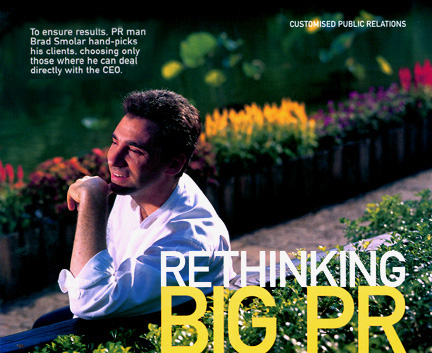 |

 |
 |
 |
 |
 |
||
 |
||
| Anthony Blass, Editor - BOSS Magazine | |
 |
 |
| In one year,
Brad Smolar earned a sleepy Hong Kong client more media exposure
than the big agencies delivered in 15 years. Exasperated, he dumped the latest in a series of brand name PR firms, which he would not identify, and in November 2001 retained a boutique firm, with extraordinary results. Actually, "boutique" is probably stretching it. Elman hired Brad Smolar, a one-man operation in Hong Kong, a fellow so lacking in traditional PR experience that he has not even mastered marketing himself, which ironically is part of his appeal. He does not have a Web site, high-gloss brochures, glitzy hand-outs or, to his credit, much of an ego. "Everything," Smolar says, "is on my business card." He may be a humble PR foot soldier, but Smolar delivers. And the
impact on the companies he represents is considerable, especially
relative to the cost. At a time when advertising spending is drying
up, companies are turning aggressively to PR to bridge the awareness
gap. According to one respected poll in the US, the average corporate PR budget increased by 21 per cent in 2001. In Asia and the US, more of that budget than ever is going to boutique firms with specialist skills. And the stakes are higher than ever. If executed properly, a PR strategy can benefit a company in ways that traditional advertising cannot. Anyone, after all, can place an insert, but you can't buy meaningful press coverage. Good PR in first-tier news organisations enhances workplace morale, attracts quality employees, intrigues investors, dissuades competition, reinforces market leadership, comforts suppliers and persuades consumers. Identifying the virtues of a PR strategy, of course, is entirely different from securing their benefits, as the long-suffering Elman will attest. Unfortunately for Smolar and his brand name predecessors, publicity-challenged Noble is a marketer's worst nightmare. There isn't an exotic bone in its corporate body. Its business - trading metals, cocoa and other commodities for razor-thin margins - is boring. How much can you say about a middleman, even one that generates US$1.2 billion in revenue? The company's chief executive is an accomplished, to-the-point businessman and, by most accounts, a strong leader. But by his own admission, Elman is hardly a quote factory. Although he is charming and warm, it is fair to say that at 61 he probably relinquished his leading-man looks some years ago. Hardly cover material. Of course, Noble is publicly traded, which makes it an automatic lightning rod for press coverage - or not. Unfortunately, Noble shares are traded in Singapore, but the company is headquartered in Hong Kong, which leaves editors wondering whose story it is, theirs or ours. Answer: nobody's. Enter Smolar, who was referred to Elman by a business associate. On the strength of one recommendation, endless frustration and Elman's "gut" feel, Smolar earned a one-year retainer with Noble in November 2001. At that time, they discussed Noble's PR goals for the ensuing 12 months, and Elman provided Smolar with a modest wish list. Fulfilling it turned out to be child's play for Smolar. By January, Elman was on the cover of the Far Eastern Economic Review, where Noble was the subject of a flattering five-page cover story. Three months later, Noble and its treasurer, David Sullivan, shared a cover story in CFO Asia magazine with supply chain giant Li & Fung. In May, Smolar arranged for Elman to speak for the first time at the prestigious CLSA Investors' Forum in Hong Kong, a prized invitation that had eluded Elman and his PR handlers in previous years. The momentum continued; in July, Elman and Noble's senior management team were featured on Managing Asia, CNBC's 30-minute genuflection to management prowess. When Smolar turned 40 this summer, Noble's entire executive team took him to lunch, celebrating not only a birthday but also half a year of publicity that outstripped by most measures all the media exposure Noble had garnered since Elman founded it in 1986. "I don't know how he does it," Elman says of Smolar. "But he does it." Smolar contends that there is no black magic to successful PR and that he simply does the little things well, which appears to be a humble oversimplification. A native of suburban Boston and a graduate of the University of Miami, Smolar has a traditional liberal arts background, with no formal training in PR. But he is a natural salesman. He arrived in Asia in 1989 at age 26, eager to prove himself. He was part of a small group of ambitious but seemingly naive entrepreneurs who believed Hong Kong should host an ATP tennis tournament to rival the Marlboro Open, a popular exhibition event that did not provide tour ranking points for participants, as ATP events do. Smolar's job was to line up more than US$1 million in sponsorship commitments for the proposed tournament and to secure a title sponsor, a seemingly impossible task for a young foreigner who was still fumbling with chopsticks and learning his way around the mass transit system. "I cold called every managing director in Hong Kong," he says. His persistence paid off. Smolar persuaded R.J. Reynolds Tobacco to sponsor the event, and the Salem Open was born in Hong Kong, arguably Asia's most prestigious tennis tournament. Smolar remained with Spectrum, the company that now manages the event, until 1998, when he struck out on his own. In his nine years with Spectrum and its predecessor, he raised more than US$50 million in sponsorship fees, despite having no formal sales training. In many ways, he says, PR was a natural next step because it capitalised on his "soft-selling" nature, growing commercial instincts and enviable network of contacts. Even so, the challenges of one-man PR are considerable. Boutique firms and specialists such as Smolar must overcome specific and significant weaknesses in order to deliver more value to their clients than a big firm with more resources, greater reach and a more varied package of services. Typically, specialists achieve this by providing greater depth of service and often focus on small to medium-sized companies. But focus is only part of the solution. Making PR strategic Smolar achieves uncanny results in part by hand-picking clients (he works with a maximum of four retainer accounts at a time), choosing those with whom he has direct access to the CEO. This is key. When the CEO is involved and committed to PR planning first-hand, it becomes a strategic endeavour. When the task is handed down to a marketing manager to liaise with a PR firm or simply outsourced with a brief, the approach is almost always tactical and the execution is left to junior staff. Unfortunately, few junior staff - even those with brand name companies behind them - have direct relationships with more than a select group of media. Smolar knows virtually everyone. Direct access to the CEO also means that a specialist like Smolar knows the company and its strategic imperatives as well as many of its officers. When he speaks with journalists on behalf of a client, Smolar does so with confidence and authority, providing not only the facts but also the commercial and strategic nuances that are difficult for a big firm of revolving associates to fully understand and communicate. Quality over quantity is another differentiating factor. Smolar convinces his clients, some grudgingly, that the best way to control their PR message is not by expanding coverage indiscriminately but by limiting it to specific titles and programs. Established weekly and monthly publications spend more time cultivating a story than daily newspapers or wire services, and they often rely on more senior editorial talent to execute and package features. "We care about high-quality, well-placed stories that carry the key messages to stakeholders in the company," Smolar says. Another fan of Smolar's is Vincent Wan, an entrepreneur who brought Perrier to Asia in 1979 and has since built a small business empire on the back of the French designer water. He was Smolar's first big-name PR client in 2000, but his relationship with Smolar began 10 years ago when Perrier became involved with the Salem Open. He credits Smolar with helping to position Perrier as a drink of the aspiring elite in Hong Kong, which now ranks third in the world in per capita Perrier consumption, behind France and Belgium. Like Elman, Wan has relied on his share of brand name PR companies, but he prefers the hands-on, strategic approach of Smolar, saying that the big firms "leave me cold" and do not represent good value, at least for his needs. "Using a smaller guy takes some guts, and it takes some time to train him and to understand his strengths and weaknesses," Wan says. "I would not use Brad for brand awareness or brand maintenance. We are already a brand leader in Hong Kong. Brad's job is to expand the brand, to help me reach the next level." Smolar, it should be said, is not cheap. His rates rival some of the big-name firms and his services, according to Wan, are "a luxury, not a necessity". Monthly retainer rates for outsourced PR in Hong Kong range from US$5,000 to US$15,000. Smolar declined to divulge his rates, but characterises them as "above average". Value you cannot buy Whatever the cost, it is often difficult to put a price tag on PR, especially when it is good. Smolar's efforts on behalf of Noble, for example, continue to earn dividends, in part because he has smartly maintained momentum with key news organisations and has not "overexposed" his client. "I enjoy putting people in the spotlight," he says. "The coverage they get - it's not for sale. You can't buy it." That coverage has led most recently to Elman's position as a finalist for a CNBC Asia Business Leader Award and a nomination for the DHL-SCMP Hong Kong Business Awards. Noble's share price has responded accordingly, from S$0.79 (US$0.44) on November 7, 2001, the day before Smolar signed his contract, to S$1.40 (US$0.78) on a split-adjusted basis in mid-October, an increase of 77 per cent. The broader Singapore index is up by 3.5 per cent during the same period. Elman credits Smolar with educating the media and "capturing people's attention" with a story that no one else had been able to sell. "It's hard to put a value on that," Elman says. |
© 2003 Fairfax Business Media Pte Ltd, all rights reserved. |